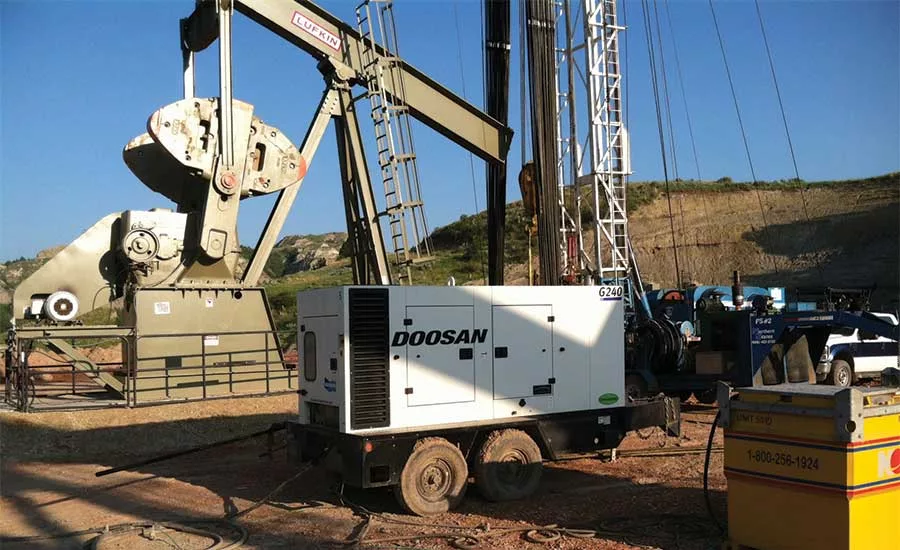Buy or Rent? Tips for Generators on Drilling Jobs

Mobile generators are among the most important pieces of equipment on a drilling site, often powering the entire operation. Because of this central role, contractors are often torn between investing in the purchase of a mobile generator or renting the machine as needed. Considering the four main factors of cost, maintenance, utilization and customization can help lead to the right decision.
Cost
Determining when to buy or rent is a business decision — one based on machine needs, cash flow, cash reserves and the availability of financing tools. If you are taking on long-term projects, then a permanent purchase of a mobile generator may be justified. Purchasing can provide tax advantages for your bottom line, a return on investment and potential resale value. As with any purchase, the value of the generator will depreciate over time, and monthly costs can fluctuate as maintenance or repair issues occur.
If a permanent purchase is not required, renting can provide a temporary solution without the need for ownership. One of the most common reasons for renting is not tying up capital by purchasing equipment. In fact, renting a generator can often be written off as business expense. Rental offers the advantage of a predictable payment and no depreciation loss. Rental agreements offer flexibility and are typically offered in daily, weekly and monthly time periods — plus the estimated usage by shift. Additional charges are incurred for generator use that exceeds the rental agreement, based on the equipment hour meter. Long-term rental expenses may eventually cost more than buying a generator.
Maintenance
Costs associated with routine maintenance — oil and filter changes, belt replacements, as well as the general upkeep of the generator — are the responsibility of the machine owner. Purchasing a generator leaves that responsibility squarely in your hands. This can be beneficial if you prefer to control the maintenance schedule and repairs.
A planned maintenance agreement is available for those who wish to focus on the business of drilling or extraction and not the business of maintaining a generator. An agreement can be arranged with a trusted dealer for an additional cost.
A planned maintenance program includes services such as oil changes, visual checks of components and filter changes as outlined by the agreement. It typically goes a step beyond routine maintenance by offering more interaction with a machine in an effort to reduce downtime and control maintenance costs.
As a machine ages, unexpected issues and repairs can also result in direct loss of production and higher costs for rush parts orders. The goal of a planned maintenance program is to eliminate the risk of downtime by identifying and resolving an issue before a machine failure occurs.
For most rental agreements, all service and maintenance is the responsibility of the equipment store or dealership. Renting a generator not only eliminates the cost associated with machine maintenance and upkeep, but also the time and labor. It also decreases the potential for equipment downtime. A rental generator that experiences a shutdown must be replaced by the rental company.
Utilization
The utilization of the generator is another consideration when deciding between a rental or purchase option. For applications that require constant production, owning a generator makes it possible to avoid disruption. Negotiations involving rental price, rental terms and timelines are eliminated with the purchase of the generator. It also allows freedom of utilization — the machine can be used whenever and wherever needed without the hassle of locating an available generator, renegotiating terms and pricing, or scheduling delivery and setup.
Conversely, generators used for short periods, such as well water drilling, may be best served by a rental agreement. This limits the rental cost to times when the generator is producing revenue, rather than sitting idle. The flexibility of renting a generator also allows you to adapt to market fluctuations.
Customization
Those with a preference for a specific brand of generators may be better served by purchasing a generator model with the customization desired. Purchasing a generator affords control over the brand, model, technology and specialized features for unique applications or harsh conditions. While a purchased generator might allow for more customization and technology up front, the machine will become outdated.
While a rental agreement offers flexibility, generators in a rental fleet may not be suited to applications that require specialized features or customization, such as dusty conditions, subzero temperatures or remote location. Generator selection from a rental fleet is typically limited to the models and brands sitting in the equipment yard. The limited selection can interfere with productivity if an operator is unfamiliar with a brand’s interface and operating procedures.
Mix of Machines
Ultimately, the decision between renting and purchasing a generator doesn’t need to be mutually exclusive. Some contractors find that a mix of owned generators, supplemented by rental machines as demand dictates, allows for a balanced fleet that draws upon the advantages of each option. For each generator added to the fleet or rented for a drilling job, taking into account the four main considerations will help ensure the decision isn’t being driven by one factor alone.
Looking for a reprint of this article?
From high-res PDFs to custom plaques, order your copy today!




